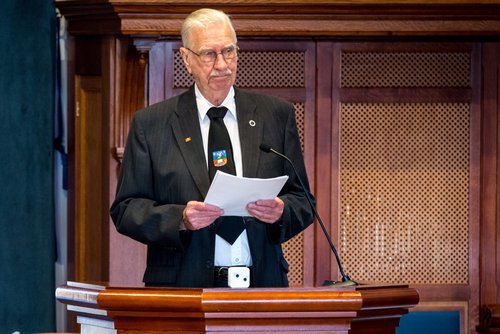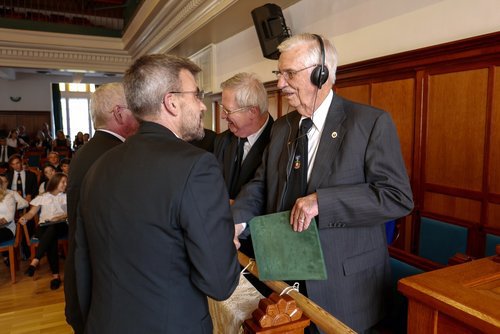
The Sárospatak Reformed Theological Academy is part of a wider spiritual community. Several outstanding scholars and church personalities have committed their lives to this institution. It is a privilege for the academy to honour and appreciate this commitment by granting honorary professorships. On 10 September 2017, at the opening ceremony of the new academic year, Dr Robert Edison Bailey (Presbyterian Church, USA) was awarded this title. What follows below is his laudation:
“In different parts of the world, we try live our faith as Christians in different countries and cultures, in different denominations. We know this, but this idea is not necessarily present in our everyday lives. Sometimes, however, it happens that we find ways to one another, for example Hungarian Reformed people to North American Presbyterians. Not just in general, but person to person, community to community. These are very special, mutually enriching, constructive encounters, especially when a person as open-minded as Robert Edison Bailey, a minister not afraid to make sacrifices, and willing to serve others, is one of the partners in such an encounter.
His willingness and dedication is well characterized by the fact that near the age of 90, he undertook all the troubles and pains of this long trip, and visited for at least the twentieth time, not only to attend this ceremony but to visit those here in the Carpathian Basin who have become important to him and to the Church he represents. He is not here just for a holiday, but he immediately attached working days to his visit, which will be real feast days for the hosting communities (whether they are congregations or other church institutions). He still contributes to the lives of our communities.
And this is not an exceptional case in Robert Edison Bailey’s life. Looking through his biography, we see that he was always there where he was needed. His ministry has never been determined by the desire to rise above others, or to increase his wealth to insure a safe earthly existence, or to increase his authority. Instead, his ministry has been determined by the needs of others: the needs of communities, educational institutions and churches. Thus, it can happen that someone who has been in the ministry for almost 65 years, has, most of the time been replacing others and has served churches that no one else wanted to serve.
Let us take a very short look at the main stages of his life, including his relationship with the Tiszáninnen Church District.
1. Robert Edison Bailey completed his higher education studies between 1950 and 1962:
In 1950 he got his B.A. in history at Grove City College, Pennsylvania
In 1953 he got his B.D. at the Theological Seminary of University of Dubuque, Iowa, which later was made into a M.Div. In the same year (1953) he was ordained by Pittsburgh Presbytery, in Pennsylvania.
In 1962 he completed his Ph.D. in New Testament studies at New College, University of Edinburgh, Scotland.
2. He had the opportunity to share his knowledge at various universities and colleges:
Between 1956 and 1965 he was on Faculty of University of Dubuque, and was made Professor in 1963.
Between 1965 and 1983 he was on Faculty of Park College, near Kansas City, Missouri, where he also held the Chair of the Philosophy and Religion Department. While on Faculty of Park College he served as visiting Professor of New Testament at the Methodist Seminary in Kansas City on two separate occasions, altogether for two academic years.
In 1984 he was assistant Professor of Sociology, at Missouri Southern State College (now University), in Joplin, Missouri.
3. In the course of a minister’s life, it is common that serving in congregations comes at the beginning, and is then followed by, and is perhaps crowned by teaching at a seminary. For Robert Edison Bailey this was not the case. After nearly three decades of teaching, seeing the needs of the communities of his church, he returned to the ministry:
In 1983 and 1984 he was installed as a Pastor at Presbyterian Church, El Dorado Springs, Missouri.
He provided supply pastoral services:
between 1991 and 1999 at Warrendale Presbyterian Church, St. Paul, Minnesota;
between 1999 and 2002 at Rockford Presbyterian Church, Minnesota.
In August 2002 he moved to Jefferson City, Missouri, from where he further supplied the pulpits of several churches:
In 2003 and 2004 he served as Interim Pastor at Big Creek Presbyterian Church;
between 2006 and 2010 he was interim Pastor at Palmyra Presbyterian Church;
from April, 2010 up to June 2016 he served as Temporary Supply (temporary for six years!) at Bethel-Salem Presbyterian Church.
Currently he is serving on Missouri Union Presbytery General Council, Trustees, the Administrative Commission, and the Hungarian Mission Team.
He began visiting Hungary in 1995 as head of a group of three minister members of the Presbytery of the Twin Cities Area, Minnesota, to explore creating a relationship with the Reformed Church of Hungary. As a result, the Presbytery and the Transdanubian District formed a relationship. He started organizing partnerships between churches in the Presbytery and congregations in the Transdanubian District. In 2002 he moved to Jefferson City, Missouri, where he and his wife got involved in the Missouri Union Presbytery’s relationship with the Tiszáninnen Church District which had started in the 1980s. Between 2010 and 2016, due to his initiative and careful organizing, the relationship between the Missouri Union Presbytery and the Tiszáninnen Church District was complemented by the church-to-church partnership program. During that period, I had the privilege of working with him in coordinating that program for a few years. Last year I received a letter of farewell from him, which I, rudely, did not respond to. I had good reasons for doing so; I wanted him to receive the official notification about our senate decision, approved by the Church District, about him being appointed to honorary professorship. That is how he is here among us, allowing us to express our gratitude and appreciation for him in our own special way.
We are sorry that his dear wife, Annel was unable to accompany him due to the state of her health, but we are thinking of her with love and will keep her in our prayers.
In summary, I would like to recall an image from the past of this academy, from the village-seminar movement of the 1930s, when the institution made significant efforts to understand and recognize what the villages and village life were like where most of our churches existed, while also trying to stay on its feet among the storms of history, and to think responsibly about the future of the church. If I remember correctly, an idea was born during that period which also became the motto for seminary training: send the best to the hardest places. Robert Edison Bailey’s life and ministry fit well with this picture.”

Written by Gabriella Rácsok
vice rector of the Sárospatak Reformed Thelological Academy